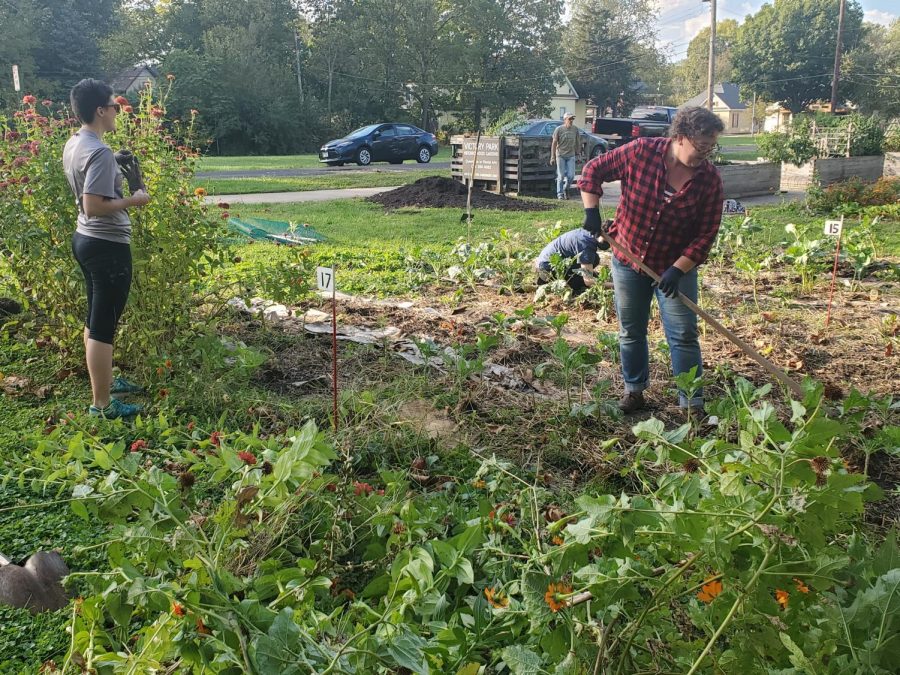Solidarity Gardens C-U fights food insecurity with locally sourced produce
Photo courtesy of the C-U Solidarity Gardens
Volunteers work at one of the C-U Solidarity Gardens. Besides having their own gardens for volunteers to utilize, the organization accepts homegrown donations such as excess produce.
May 20, 2022
Surrounded by miles and miles of Illinois farmland, Champaign-Urbana seems like the last place to have people worrying about where their next meal will come from. Despite living on rich soil, many C-U residents rely on food subsidies which cannot cover the daily cost of food.
The Solidarity Gardens C-U, a collaborative project between various community organizations, aims to provide food-insecure members of the community with fresh and locally sourced food.
To address increasing food insecurity at the start of the pandemic, Cunningham Township partnered with Sola Gratia Farm, the Channing Murray Foundation, the Urbana Free Library and the Urbana Park District to create the Gardens in June 2020.
Fiona Munro, the outreach and volunteer coordinator for Sola Gratia Farms, became involved in the organization at the beginning of the pandemic. She said that the Solidarity Gardens was created at a time when many were losing their jobs and struggling financially.
“A lot of folks who had certain systems that allowed them to access food were suddenly losing those systems,” Munro said. “At the same time, a lot of people who had once been super busy with jobs that required commutes and things like that were working from home and wanted things to do.”
Get The Daily Illini in your inbox!
As C-U residents took up gardening to fill their time, community organizations saw a way to address the food crisis by allowing people to donate their excess produce.
In addition to homegrown donations, the Solidarity Gardens has its own community gardens where volunteers come to grow and harvest various crops.
“We’ve grown about a little bit over four thousand pounds of food over the course of the two years that we’ve been operational,” Munro said. “That includes food that has been grown in people’s home gardens that they’ve donated and in the community gardens that we manage.”
The success of the Solidarity Gardens can be attributed to the work of volunteers around the C-U community who have dedicated their time and energy to this cause. Blake Cedergren, the community garden liaison, first heard about the Solidarity Gardens last summer when walking past a flyer. Since then, he has been volunteering for the Gardens twice a week and recently became involved in volunteer coordination.
“It’s also really encouraging to see the support that volunteers can provide for the community through volunteering,” Cedergren said. “It’s been really nice to interact with people and talk to them about the projects and a lot of people are just really happy that it’s happening.”
The Solidarity Gardens takes volunteers to do a variety of jobs from growing crops to designing signs. This year, they will start taking volunteers to cook and prepare meals with the food grown for those in the community who may not have time to cook.
The food that is grown and donated is given to the Eastern Illinois Food Bank, Daily Bread Soup Kitchen, Jubilee Cafe, Little Free Market and other local food centers where anyone who wants or needs a meal is able to get one.
Aside from providing fresh food and meals to those who are food insecure in the community, the Solidarity Gardens also provides resources for people to grow their own food. The project facilitates a seed exchange at the Urbana Free Library, where anyone can get free seeds to grow produce and then donate saved seeds at the end of each season. It also manages a tool lending library at Cunningham Township that allows people who may not have access to gardening supplies to begin growing their own food.
The collaborative aspect of this project draws upon work from various community organizations, with each bringing something different to the table. The motivation to provide fresh, healthy and accessible food for those in the community with low incomes is what all these organizations strive to do.
“All of those organizations are doing super great work in the community even outside of the Solidarity Gardens,” Munro said. “This is really just a meeting of minds around this one thing. It’s been a real privilege to work with folks from all of those organizations and see what we’ve been able to create together.”







